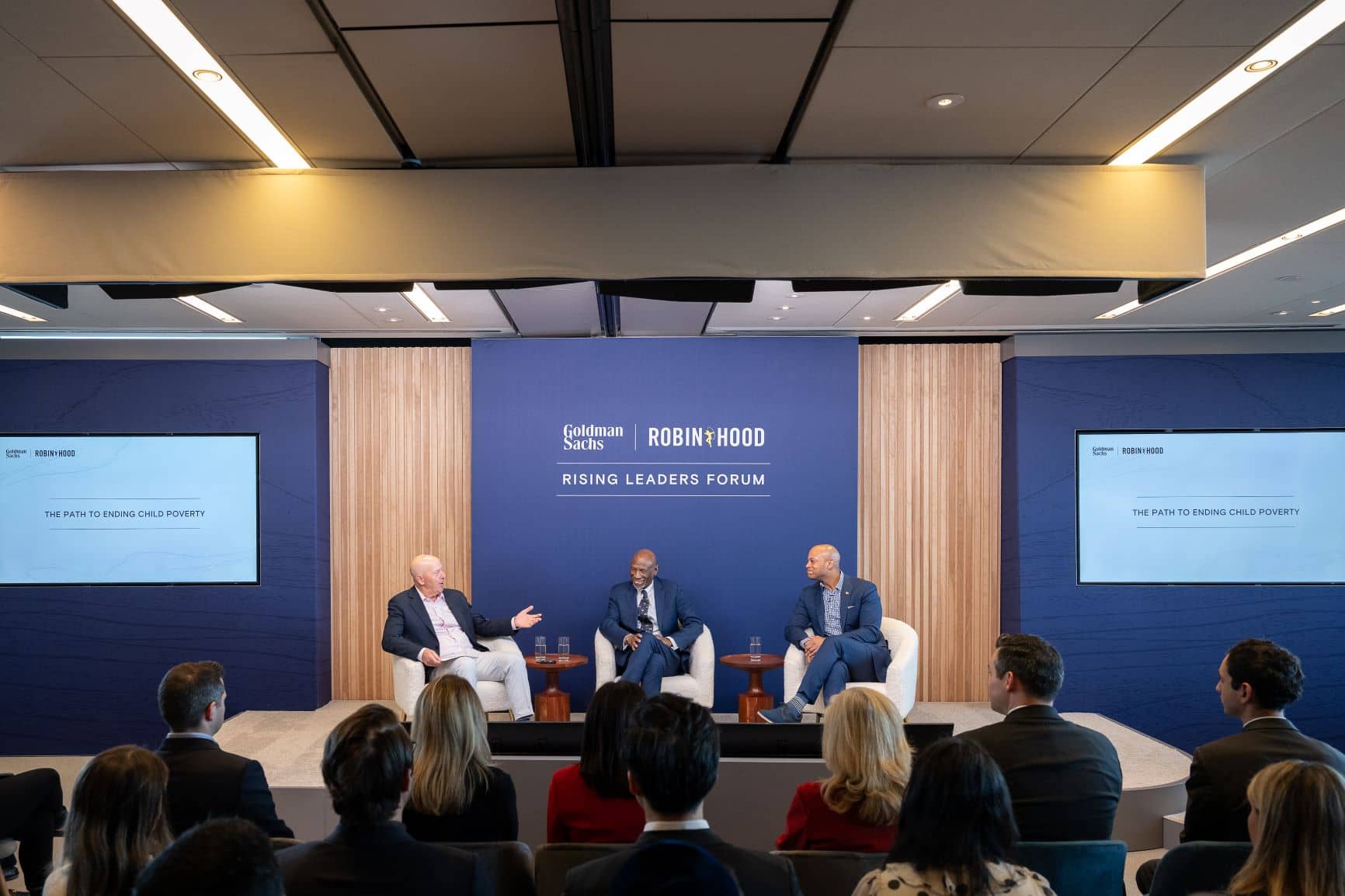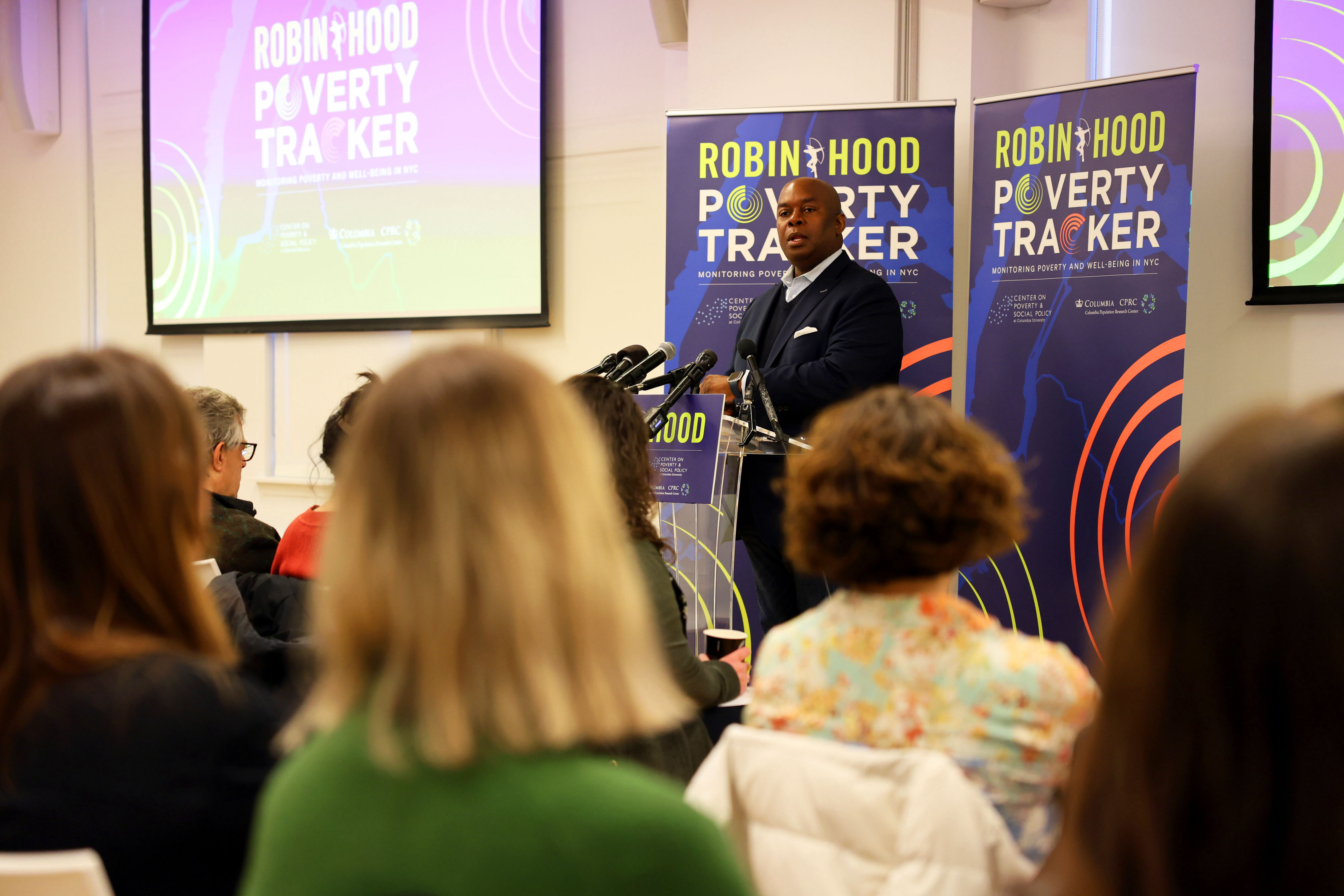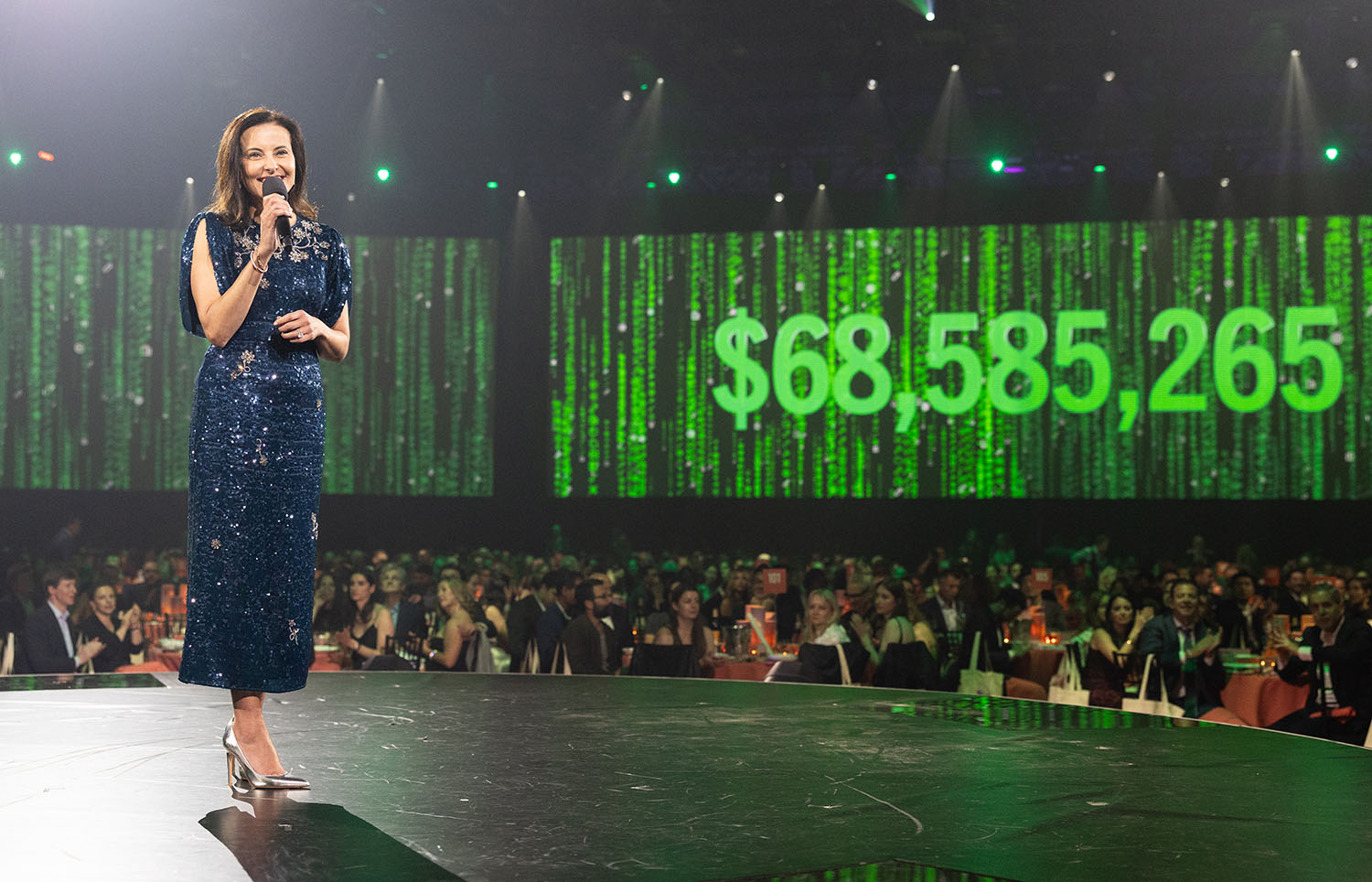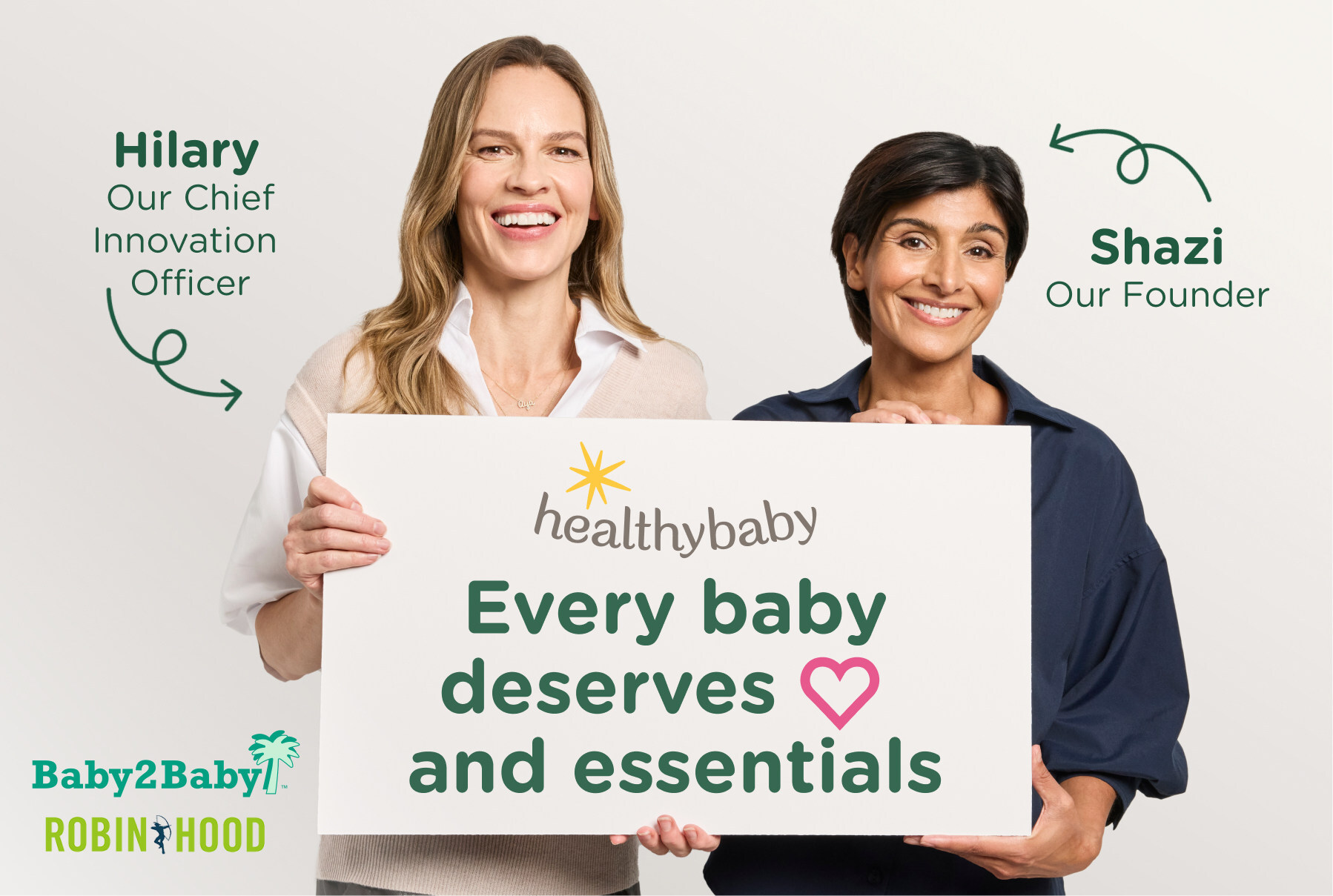Apr 21, 2025 Press Release
Three Best-in-Class Solutions Win Robin Hood’s AI Poverty Challenge
Three awardees were selected from almost 200 applications and nine finalists in the AI Poverty Challenge, a national competition announced in 2024 to promote the use of AI as a tool to combat poverty by fueling opportunity. The Challenge has made nearly $4 million in awards across three categories.
NEW YORK, NY — April 21, 2025 — Today, Alexis Ohanian, a Robin Hood board member, announced three winners of the AI Poverty Challenge, a national competition launched in February 2024 to advance effective, responsible, and equitable uses of AI that broaden opportunity and support upward mobility for people living in poverty. The awardees are Beyond 12 from California in the category of Education, The Legal Aid Society from New York in the category of Financial Empowerment, and CodePath from California in the category of Workforce Development. Each awardee receives the $1 million grand prize.
The three grand prize awardees emerged from a competitive field of nearly 200 applicants across 21 states and were among the Challenge’s nine finalists named in September 2024, each receiving $100,000 awards. Their AI solutions are making a college education more attainable for low-income students, opening pathways for in-demand jobs that require fluency in computer science, and increasing the capacity to deliver legal services for housing, public benefits, immigration, and beyond.
“Last year, I stood alongside Robin Hood founder Paul Tudor Jones as we launched the AI Poverty Challenge, a bold initiative to find and fund AI-driven solutions to fight poverty—inspired by real people, their challenges, and their potential. In my experience as a founder, community voice often differentiates successful ventures from flailing ones. In the case of the AI Poverty Challenge, that means bringing people who live in, or near poverty closer to decision-making and product development. Today, I’m thrilled to celebrate three game-changing champions, who have literally risen to the challenge, each receiving $1 million to scale their work. They represent the best and brightest ideas harnessing AI for good,” said Alexis Ohanian, Founder of Reddit & Seven Seven Six, and Robin Hood Board Member.
The Challenge is made possible through a partnership with the GitLab Foundation, the Bezos Family Foundation and Deloitte. It was originally announced by Paul Tudor Jones II, Robin Hood’s founder, and Alexis Ohanian, at its February 2024 Robin Hood Opportunity x AI Summit.
“Today’s grand prize awardees are leveraging the AI revolution as a force to increase upward mobility from poverty and ensure that those already excluded from opportunity are not left further behind. Each entrepreneur has brought their tech solutions to life with the direct input of communities and users who will benefit from the products – demonstrating that AI is something people experiencing poverty can do, rather than something that is done to them,” said Richard R. Buery, Jr., CEO of Robin Hood. “My congratulations to each of the grand prize awardees. Through your ingenuity and talent, we will prove and scale incredible uses of AI for good.”
About the Grand Prize
In the Category of Education
Beyond 12 (California)
A Gen AI College Success Coach to Increase Economic Mobility
Beyond 12 is revolutionizing student success coaching with MyCoach AI, a personalized, culturally inclusive, and evidence-based GenAI-powered coach designed to help millions of historically underserved college students thrive. According to the National Association of Colleges and Employers, while 1.4 million low-income or first-generation students enter college each year, only 30% graduate and transition to a high-quality job or pursue advanced degrees. Even among those who earn degrees, graduates from under-resourced families begin their careers earning nearly one-third less than their wealthier peers. To close this degree and opportunity gap, Beyond 12 is augmenting a commercially available large language model (LLM) with over a decade of proprietary student-coach interaction data, its evidence-based coaching curriculum, campus-specific insights, and culturally inclusive tone-of-voice guidelines. The result is a proactive, conversational, and Socratic digital coach that can deliver high-impact, personalized support at scale—while reserving human coaches for the complex, relational guidance that only humans can provide. By blending the power of AI with the heart of human connection, Beyond 12 is scaling its proven coaching model to ensure all historically underserved college students have the opportunity to earn post-secondary degrees that allow them to break cycles of poverty and lead choice-filled lives.
Founder & CEO of Beyond 12, Alexandra Bernadotte said, “Far too many students from under-resourced communities navigate college without the support they need to succeed—not because they lack the talent or potential, but because our systems were not designed with them at the table. At Beyond 12, we’re using the power of GenAI to change that—to reimagine what support looks like at scale and to ensure that every student has access to the tools, knowledge, support, and networks to thrive. We are deeply honored to be recognized by Robin Hood and the other AI Poverty Challenge partners, and proud to join a community of innovators committed to building a future where a student’s background does not determine their destiny.”
In the Category of Financial Empowerment
The Legal Aid Society (New York)
AI with a Human Touch: Streamlining Helpline Services
The Legal Aid Society’s AI-powered Housing Helpline Information Retrieval Tool aids attorneys and paralegals by swiftly summarizing vetted information, allowing faster hotline response times, increasing the number of people who can be served, and improving client satisfaction while maintaining human connection and quality control. While paralegals can often answer common questions based on their specialized training, more complex inquiries previously required them to manually search through a 180-page informational wiki or consult with a supervising attorney. This process could take several hours or even days to respond thoroughly, especially if attorney follow-up was needed. The introduction of a generative AI tool significantly accelerates this process by providing immediate responses to inquiries. It enhances the callers’ experience by reducing wait times, providing more same-day responses, and quickly generating email summaries of the advice in the caller’s preferred language. In addition, supervising attorneys can now spend more time assisting on complex matters. Developed through a longstanding partnership with Columbia Law School’s Lawyering in the Digital Age Clinic – which serves as a tech incubator – this tool operates in a closed secure ecosystem, using vetted materials to help staff promptly find and summarize information. The solution leverages the Legal Aid Society’s expertise as NYC’s largest and oldest legal service and will enhance the team’s ability to drive systemic change through informed advocacy and policy reform.
Adriene Holder, Chief Attorney of the Civil Practice at The Legal Aid Society, said: “At The Legal Aid Society, we are harnessing the power of technology to break down barriers to justice for every New Yorker, regardless of income. This incredible award from the AI Poverty Challenge will enable us to expand and refine our AI-powered Housing Helpline, making legal assistance faster, smarter, and more accessible for those facing housing insecurity. The grant will unlock critical AI infrastructure, including scaling vector databases for legal needs outside of housing, and refining AI models with expert prompt engineering support. By combining cutting-edge AI with the irreplaceable expertise of our advocates, we’re not just streamlining legal support—we’re transforming how communities access justice. We are honored by this recognition and excited to keep pushing the boundaries of innovation in service of those who need it most.”
In the Category of Workforce
CodePath (California)
Transforming Tech Education and Employment Outcomes for Underrepresented College Students
CodePath will use AI to personalize learning content to enable all students – regardless of background or university – to thrive in computer science programs. This solution transforms industry-oriented tech education for underrepresented college students. Today, CodePath’s proprietary learning management platform manages course logistics and allows instructors to choose content modules appropriate for their students. CodePath is designing context-aware AI tutors to support students’ personalized learning progression. The AI Tutor will incorporate course content and continuous evaluations of students to provide relevant, personalized support. This enables a wider range of students to master the curriculum and prepare for upwardly mobile tech careers. All AI solutions are being built with safeguards and care, including extensive testing, and progressive rollouts to mitigate unintended harm. CodePath’s systems and tools have been developed incrementally, using lean testing methodologies, to ensure that each aspect of the learning platform contributes to maintaining the quality of education as the scale increases and that it does so without creating bias.
CodePath CEO, Michael Ellison, said “We’re honored to be recognized by Robin Hood’s AI Poverty Challenge for our innovative approach to transforming tech education. This award enables us to expand our AI-powered platform, offering personalized learning pathways and context-aware AI tutors to ensure all students, regardless of their background or university, can master the skills required for upwardly mobile tech careers.”
Finalists were determined by a rigorous scoring and review process administered by a panel of over 100 judges selected for their areas of expertise, including people who have lived experience with poverty and those who support them. Once selected, the finalists participated in a five-month acceleration period. Each finalist received $100,000, a feedback session with Robin Hood’s Blue Ridge Labs Design Insight Group comprised of people who are potential users of the solutions, and workshops by experts in design, outcome measurement, law, and other relevant issues organized by Robin Hood’s Management Acceleration team. During this period, Robin Hood staff engaged with each of the finalists to better understand their teams, plans, and intended results to inform the selection of one awardee in the categories of Education, Financial Empowerment, and Workforce.
Final selection of the three winning organizations was made by the Challenge Selection Committee, which included:
- Richard Buery, CEO, Robin Hood
- Ellie Bertain, President & CEO, Gitlab Foundation
- Alexis Ohanian, General Partner, Founder, Seven Seven Six and Robin Hood Board Member
- Angela Glover Blackwell, Founder in Residence, PolicyLink and Robin Hood Board Member
- Kaya Henderson, Executive VP and Executive Director of the Rising Generations Center, Aspen Institute and former Robin Hood Board Member
- Andrew Janian, Head of Equities, Platform, Cloud & Core Engineering, Citadel, and Robin Hood Leadership Council
- Chirstine Moy, Partner, Digital Assets, Data & AI, Apollo, and Robin Hood Leadership Council
“To truly unlock the promise of advanced technologies, AI-driven solutions must be grounded in a deep understanding of the communities they aim to serve,” said Ellie Bertani, CEO of the GitLab Foundation. “These three organizations demonstrate how practical, real-world applications of artificial intelligence can drive meaningful progress and high returns on investment in education, workforce development, and financial empowerment. We’re proud to support their work through the AI Poverty Challenge and excited to see their impact.”
###
About Robin Hood
We are NYC’s largest local poverty-fighting philanthropy and since 1988, we have invested nearly $3 billion to elevate and fuel New Yorkers’ permanent escapes from poverty. In 2024, through $129.5 million in grantmaking with 285 community partners, we created pathways to opportunities out of poverty through our strategic partnerships on child care, child poverty, jobs, living wages, and more. We are scaling impact at a population level for the nearly 2 million New Yorkers living in poverty. At Robin Hood, we believe your starting point in life should not define where you end up. To learn more about our work and impact, follow us on X @RobinHoodNYC or go to robinhood.org.
Media Contact
Crystal Cooper, Deputy Director, Communications, Robin Hood
press@robinhood.org




